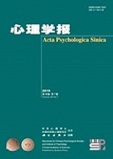|
|
EFFECTS OF SUPPORTIVE CONDITIONS ON AGE DIFFERENCES IN MEMORY
Luo Lin Han Buxin(Institute of Psychology, The Chinese Academy of Sciences, Beijing 100101)
2001, 33 (05):
22-26.
Three experiments were conducted to explore the effects of cognitive supports on age differences in memory. In Experiment 1, encoding condition and semantic integration level were varied, while the combination of subject-performed (SPT) encoding and well-integrated (WI) items produced reduced age differences, applying these conditions alone did not affect age differences. In Experiment 2, cued recall task was used; for poorly-integrated (PI) items, using noun as retrieval cue had a greater supportive effect on younger subjects compared to older adults. In Experiment 3, structured list was used as memory material; a negative cueing effect of verb cue was found. In addition, combining SPT encoding with categorical cue resulted in larger age differences. It is suggested that the variances of age differences in memory reflect an interaction between encoding condition, memory materials and retrieval condition. The different patterns are discussed in terms of the strategic nature of encoding, self-initiated processing and encoding-specificity principle.
Related Articles |
Metrics
|




